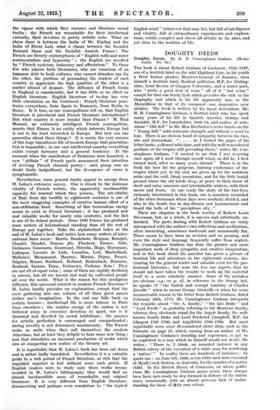DOUGHTY DEEDS
THE book is about Robert Graham of Gartmore, 1735-1797, son of a Scottish laird on the wild Highland Line, in his youth a West Indian planter, Receiver-General of Jamaica, then himself a Scottish laird, Radical politician, M.P. for Stirling- shire, Lord Rector of Glasgow University„and a minor poet, who " wrote a good deal of verse " all of it " but verse," , except for that one lovely lyric which provides the title to his biography and which in his life apparently was, as the Marseillaise in that of its composer—une inspiration sans recidive. The book is written by his lineal descendant, Mr. R. B. Cunninghame Graham, a Scottish laird who has spent many years of his life in Spanish America, hidalgo and Socialist, M.P. for Lanarkshire, 1886-92, and author of note, whose " Old Self " in Mr. Max Beerbohm's series bursts on the " Young Self " with centauric strength and without a word to lose. There is an obvious bond of sympathy between the two, sire and descendant. " . . . . As I turned the pages of his letter books, yellowed with time, and with the well-remeMbered perfume of the tropics still pervading them," writes Mr. Cun- ninghame Graham, " it seemed to me that I was re-acting once again all I went through myself when, as did he, I first turned laird, after so many years abroad." There is in the book the love for the gorgeous, burning exuberance of the tropics which yet, in the end, are given up for the northern mists and the cold, bleak mountains, and for the little burial ground where the old lairds sleep, at peace in their home of short and rainy summers and interminable winters, with their snows and frosts. As one reads the story of the two lives curiously intertwined in this book, one is somehow reminded of the other Scotsman whose days were similarly divided, and who in the South Sea in day-dreams saw ,Lammermuir and heard the bells of his " precipitous city ."
There are chapters in the book worthy of Robert Louis Stevenson, but, as a whole, it is uneven and artistically un- finished. The parts dealing with Robert Graham are richly interspersed with the author's own reflections and meditations, often interesting, sometimes irrelevant and occasionally flat. There seems to have been no revision and no pruning, and even the style and language frequently suffer from neglect. Mr. Cunninghame Graham has done the greater and more important work of deep sympathy and creative imagination, and in this book about his ancestor has given a picture of Scottish life and adventure in the eighteenth century, fas- cinating for the general reader and valuable even for the pro- fessional historian ; but none the less one regrets that he should not have taken the trouble to work up the material itself in a more scholarly manner. Some of the mistakes are obvious--e.g., on p. 45, in reference to the Stamp Act, he speaks of " the foolish and corrupt ministry of Charles Greville " when he means George Grenville or when for some inconceivable reason in the letter from Robert Graham, dated February 20th, 1778, Mr. Cunninghame Graham interprets the remarks about " the A. family," " the late Duke " and " Lord Fredk." as probably referring to the Montrose family, whereas they obviously stand for the Argyle family, the well- known fourth Duke and Lord Frederick Campbell, M.P. for Glasgow 1761-1780, and Argyllshire 1780-1799. But most regrettable seem some ill-considered obiter dicta, such as the footnote on page 57, which, coming from an author of Mr. Cunninghame Graham's standing and experience, is apt to be exploited in a way which he himself would not desire. He writes : " There is, I think, no recorded instance in any British colony of the execution of a white man for murdering a ' native. " In reality there are hundreds of instances ; to quote one : on June 9th, 1838, seven white men were executed at Myall Creek Station, in Australia, for the murder of a native child. In the British House of Commons, on whose politi- cians Mr. Cunninghame Graham pours scorn, there always have been men ready to step forward in defence of the native races, occasionally with an almost perverse lack of under- standing for those of their own colour.


































 Previous page
Previous page